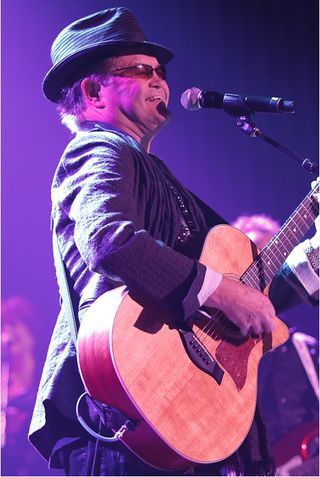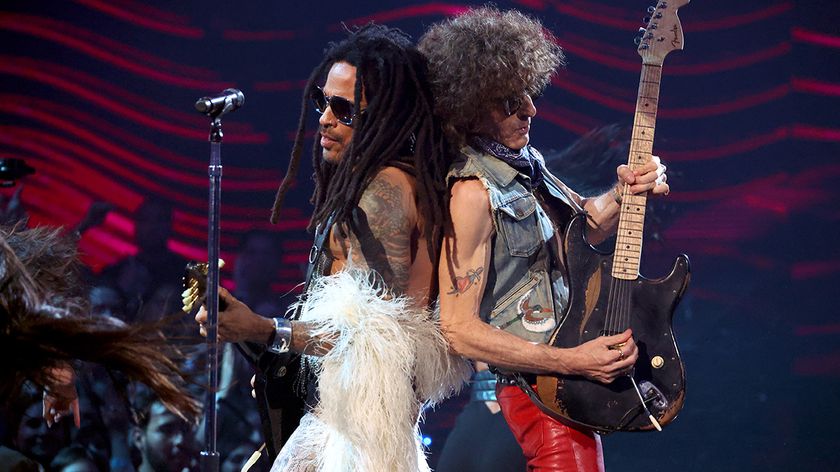Micky Dolenz Talks Music, Monkees, Jimi Hendrix and The Beatles

Fifty years ago, Micky Dolenz’s agent called him about an audition for a new pilot about music and comedy.
It was the beginning of a journey that would take Dolenz, Davy Jones, Michael Nesmith and Peter Tork to the world of super-stardom.
Although the show would last only two seasons, the impact the Monkees had on music cannot be ignored. Their first four albums went to Number 1 and included such hits as "Last Train to Clarksville," "I'm a Believer," "(I'm Not Your) Steppin' Stone" and "Pleasant Valley Sunday."
The Monkees have sold more than 65 million units worldwide, easily putting them on par with the biggest artists of all time and making a case for their placement in the Rock and Roll Hall of Fame.
Dolenz has seen a lot of musical history up close, including touring with Jimi Hendrix and sitting in while the Beatles were working on the Sgt. Pepper’s Lonely Heart's Club Band album. Dolenz’s 2012 album, Remember, contains an acoustic-driven version of a Beatles song he heard in those sessions.
I recently spoke with Dolenz about the Monkees, his career and a some of his side projects.
GUITAR WORLD: When you first got word about The Monkees, as in the show itself, did you have any idea how huge it would become?
Get The Pick Newsletter
All the latest guitar news, interviews, lessons, reviews, deals and more, direct to your inbox!
The Monkees was actually the second TV series I had. I had done a show called “Circus Boy” in the Fifties and had gone to school for architectural drafting. My plan was to become an architect when the Monkees audition came along. But when I read the pilot script and went in for the first interview, I remember thinking it might be something special. There were other shows about music at the time and a few other pilots I had been up for, but I remember telling everyone I knew that I really hoped I get this one.
What was the audition process like?
A major part of the casting process was playing and singing, and my audition piece was [Chuck Berry's] “Johnny B Goode." We were four guys with varying degrees of musical and singing ability, but we also had producers and vocal arrangers to help us out.
In your opinion, what made The Monkees show and music so timeless and special?
There’s no formula. You can't say it was just the four of us or the songwriters, producers or writers. It really was like catching lightning in a bottle. You just do your best to surround yourself with talented people and work hard and take chances. At a certain point, the whole becomes greater than the sum of its parts. That's the magic that exists in this business.
A case can certainly be made for the Monkees being in the Rock and Roll Hall of Fame. What are your thoughts on that?
I've never been one to chase awards and inductions or things like that. It's never been part of my psyche. I’ve never been too bothered by it, although I'm flattered that the fans have started some petitions about it.
What got you into playing guitar?
When I was a child, I started playing classical guitar and Spanish [Andrés] Segovia music. I started bringing my guitar to parties at school until one day I realized that the girls liked the Kingston Trio better than Segovia! [laughs]. That’s when I started playing folk music, which eventually morphed into rock and roll.
What can you tell me about the Monkees Gretsch guitar?
It was originally a merchandise piece I was given back in the day. I’m not sure what happened to it, but I was able to track another one down recently. It’s the original design that they painted red, put a pick guard on and added all of the fancy stuff. It's a really great guitar.
What was it like meeting and touring with Jimi Hendrix?
Everyone was just blown away by him. I clearly remember many times standing in the wings with Mike Nesmith and just thinking to myself, “How the hell does he do that?!” [laughs]. To this day, I'm not sure how you can answer that question.
You sat in on one of the early Beatles Sgt. Pepper sessions. Was anyone aware of the impact that album was going to have on music?
At the time, no one knew what it was. I’m not even sure if they did. The story goes that they wanted to do something like what the Beach Boys had done. I had been invited to one of the sessions and remember getting all dressed up, thinking it was going to be this Beatle-mania, fun-fest, sort-of freak out party! [laughs]. But when I got there, it was just the four guys sitting in the studio working. They played me the tracks to what I found out later was “Good Morning, Good Morning." I still tell that story and sing that song. I also did a version of the song on my [2012] CD, Remember.
What are your plans for 2015?
There probably won't be doing too much “Monkee business” this year as we’re kind of saving it up for 2016 and the anniversary of the show. But I'll definitely be out touring solo. I also recently did a play in Connecticut with Joyce DeWitt (Three's Company) that we're trying to expand.
What can you tell me about your furniture business side project?
I've always done that kind of stuff in my life and had a full-blown shop in my home. One day, my daughter Georgia and I were at the house building a coffee table when I jokingly said we should start our own business and call it Dolenz & Daughters Fine Furniture. I was only teasing, but she thought it was a great idea and ran with it, and it’s really taken off. We have so many orders that sometimes we have to shut it down with the message "Daddy's on Tour!” [laughs].
Is it true you once auditioned for the role of the Fonz on Happy Days?
Oh, yeah. It actually came down to me and Henry Winkler. We're good friends and still laugh about it. I remember when Henry first walked into the interview. He saw me and said, "Oh, crap, Micky Dolenz is here. I'll never get it" [laughs]. But I'm so glad he did because he was a much better Fonz than I would have been. He is the Fonz!
For more about Dolenz, visit mickydolenz.com. For more about the Monkees, visit monkees.com.
James Wood is a writer, musician and self-proclaimed metalhead who maintains his own website, GoJimmyGo.net. His articles and interviews are written on a variety of topics with passion and humor. You can follow him on Twitter @JimEWood.


James is a guitarist and freelance writer who's interviewed some of the biggest names in music. He is the author of four books and his writing credits include work for Guitar World, AXS and Yahoo! as well as for his hometown newspaper where he writes on a variety of topics with both passion and humor. As a guitarist, he's performed everywhere from local bars and nightclubs to some of the biggest stages in front of thousands of music fans.

“We had 15 minutes left, and it was time to go… I just started playing that riff. Then Lenny goes, ‘Whoa, what’s that?’” Lenny Kravitz guitarist Craig Ross reveals the serendipitous roots of a Kravitz classic

“The concept of the guitar duel at the end was just appalling”: Crossroads is an essential piece of '80s guitar lore, but not every guitar legend was a fan of the film








